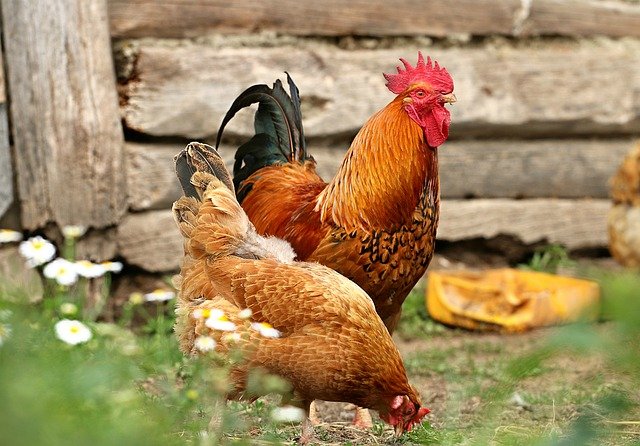What To Do When Chicken Is Bloated and Lethargic?
Rearing chickens has its own charm, whether you are doing it to liven up your yard with their clucking, or for their eggs. They are extremely low maintenance, requiring little care and attention, unless they fall ill – which happens very seldom – that can be deadly if proper care is not provided.
One of the most common illnesses seen in chickens is bloating of their abdomen area, with subsequent difficulty in walking, the chicken just prefers to sit in a warm corner, huddled and generally refusing to eat and drink, or eating very little. Seeing the chicken in this state can be quite alarming for their owners, who are normally baffled as there has been no change in their chick’s living condition which could have brought this issue.
In this article, we will be taking a look at several of the possibilities that could be making your chicken bloated and lethargic, as well as the multiple treatment options for your chicken. So, the next time your chicken’s abdomen appears distended, you are not completely ignorant about what could be causing it and its subsequent remedy.

Why Is My Chicken Bloated and Lethargic?
The reasons could differ depending on whether your chicken is young, egg bound, or old, this could give an idea of what actually is causing your chick’s abdomen to enlarge and could also be the reason your chicken is having difficulty walking.
Ascites (Water Belly)
Ascites is a condition in which fluid accumulates in the chicken’s abdomen, causing it to appear bloated. There are several reasons for this fluid retention including, heart conditions, whether that’s a tumor in the heart or a weak heart that’s causing fluids to leak out of the vessels into the abdominal cavity, or a liver disease, which can also be a tumor in the liver, that’s making the liver incapable of making the protein albumin at all or it is producing it in small quantities and as albumin is an important plasma protein that helps to keep the fluid inside the blood vessels, the lack of it is causing the fluid to leak out of them into the coelomic cavity.
Water belly can also occur if the chicken has been suffering from chronic diarrhea, which could be responsible for excess loss of body proteins and thus causing the water to effuse out of the vessels into the abdomen of the chicken.
Chickens suffering from ascites also have trouble breathing, besides losing their appetite and becoming lethargic, as a large amount of water in their abdomen compresses their lungs and air sacs, and their comb appears bluish as if it has lost its color.

Egg Yolk Peritonitis (EYP)
A problem seen in egg-laying hens is egg yolk peritonitis, in which the egg yolk released from the ovary does not enter the oviduct but rather goes into the abdominal cavity of the hen. The reason this weird phenomenon occurs in hens is that part of their reproductive tract, namely, their ovary where the yolk is produced and their oviduct through which it moves out of the body, are not directly connected to each other. So, events like stress, inflamed or cystic ovaries, and cancer of the ovaries may be responsible for yolk peritonitis.
Normally when yolk enters the coelomic cavity, the body of the hen dilutes the yolk in the abdomen by effusing fluid around it, causing the bloating, and is generally successful in reabsorbing the yolk with just mild inflammation. Sometimes, the chicken is unable to reabsorb the yolks in the abdomen cavity which leads to infections and further complications which are usually lethal for the hen.
A hen suffering from egg yolk peritonitis displays a distended abdomen, appears lethargic, and has trouble walking and when it does it has a waddling gait, it also suffers from loss of appetite, and ceases laying eggs, as they are collecting in her body cavity.
Egg Bound
Egg binding is commonly seen in quite young and old hens, it’s a pretty troublesome phenomenon in which the chicken is unable to pass out the egg and it remains stuck in her oviduct, while the hen keeps laying more and more eggs and often at times it becomes a mass of eggshells and multiple eggs stuck in her abdominal cavity.
Besides bloating, it can also damage the oviduct, resulting in bleeding, infections, and even death if the eggs remain in the oviduct for a few days without any treatment. Egg binding is generally caused due to calcium deficiency in chickens, it can also be caused as a result of obesity, or the young age of the chicken whose body is not yet mature enough to lay the egg.
Egg-bound chickens have decreased fecal output despite the straining, they usually are inactive or stand in a penguin-like pose and show a loss of appetite and thirst.
Mass (Tumor)
Tumors in the abdomen, causing an increased girth, are more commonly seen in older hens; although, they are found in a small percentage of young hens, too. These tumors affect the internal organs of chickens including the liver and oviducts, which causes the increased size of the abdomen.
Most of the tumors in chickens are chronic, which later spread throughout the poor chick’s body and result in the slow death of the chicken, over an elongated period in which the chicken loses its appetite, becomes lethargic, and appears bloated. Some of the prevalent types of tumors in chickens are nodular lymphoid tumors, myeloid leukosis, and tumors caused by Marek’s virus.
Hemorrhage
Hemorrhaging in the abdominal cavity can also make a chicken appear bloated. If you have several chickens in one enclosure where you have recently added a new member and few scuffles have been going on, or if your chicken took a fall from a raised platform, then you might consider hemorrhaging because of a trauma an issue and treat the bloated chicken; accordingly, although, hemorrhaging accompanied by a paling of chicken’s comb, as seen after severe trauma, is almost always fatal.

Some Other Causes of swollen Abdomen in Chickens
- Hens that are quite obese due to their high carb diet, can suffer from liver disorders in which the fat infiltrates the liver and cause haemorrhaging and distension of the abdomen. This often results in hens succumbing to death because of ruptured blood vessels in the liver that cause acute bleeding.
- Cystic oviducts in hens can also cause the hen’s abdomen to appear swollen. Cysts are large masses, that sometimes form on one side of the oviducts, that cause other organs in the abdomen to compress, to aid in accommodating the increasing size of the cyst and cause discomfort to the hen, too.
- Salpingitis, the inflammation of the hen’s oviduct is caused by the introduction of bacteria like E. coli through the cloaca, which causes an accumulation of rancid smelling content in the oviduct of the poor hen. This stuff sometimes mixes with the eggs and forms large quantities of funky-smelling material in the oviduct, causing the belly of the hen to expand.

Treatment
Treating chickens timely for their disorders, like many other animals can prove to be demanding as these animals which are used to living in wild are good at suppressing their illness, to not appear, like easy prey for the predators out there, that is why detecting their diseases at the correct time plays an important role in whether your chicken can fully recover from its disorder, whatever that may be. For the several causes of the bloated abdomen, we have previously discussed, there are different ways to approach their treatment.
- If your chickens appear swollen, it’s always better to take it to a vet who can collect a sample of fluid from its abdomen, and since different diseases cause different types of fluids to accumulate, your vet may be able to pinpoint what exactly is causing the swelling. If your hen is at the egg-laying stage or has previously been laying eggs, it is preferred to take its ex-ray, too, to rule out egg yolk peritonitis, and egg binding.
- At home, if your chicken starts to appear lazy and decreases its food consumption, you should make sure that she has food and water near her, as appropriate water consumption is essential, and dehydration can cause the chicken’s condition to worsen rapidly. Place the water and food bowl on a brick, so that the chicken can reach it easily and try enticing it to eat her favorite food. You can also place a microwaved sock, filled with uncooked rice that is slightly hot, under the chicken to provide her comfort and pain relief.
- If your vet rules that the fluid is due to inflammation or an infection, in which the extracted fluid appears to be clear or cloudy with a slight odor, it is better to start treating the chicken with antibiotics, as soon as possible, so the infection doesn’t spread.
- If your vet finds out in the x-ray, and the fluid sample test, that your hen is suffering from egg yolk peritonitis (EYP), in which the actual fluid in the abdomen is in minor quantity, and appears cloudy with some yolk in it, you should put your hen on low calcium diet, or ask your vet for some kind of hormonal implant to stop your hen from laying eggs, as the more the eggs that the hen produces the more of them are going to be stuck in her abdomen with an increasing chance of them getting infected and septic.
- Although getting surgical treatment for hens suffering from egg yolk peritonitis (EYP) is an option, in which the vet surgically extracts the yolks collecting in the body cavity, it is not a viable option in most cases as besides the surgery being expensive, 1/3 of the hens who undergo the procedure die while the ones that do survive and recover are sometimes unable to lay eggs ever again.
- For egg-bound hens, you should give them a high calcium diet, which sometimes aids in passing out the stuck eggs. You can also try a warm bath, or very gently try to manipulate the egg so it may be easily expelled.
- For chickens suffering from Ascites, having the fluid removed by a syringe is also an option that your vet might suggest, to help elevate the pressure on the chicken’s lung and air sacs. While draining fluid your vet will not remove all the fluid, but some only and even that very slowly as suddenly extracting a lot of fluid can cause your chicken to go into shock.
FAQs
Can I use ibuprofen for treating sick chicken?
Ibuprofen is a bad option for treating chickens as it may cause ulcers, renal damage, and upset their gastrointestinal tract. Ibuprofen residues are also found in the bird’s egg for quite some time after its consumption, which renders the egg useless and cannot be eaten or sold following the FARAD’s act.



